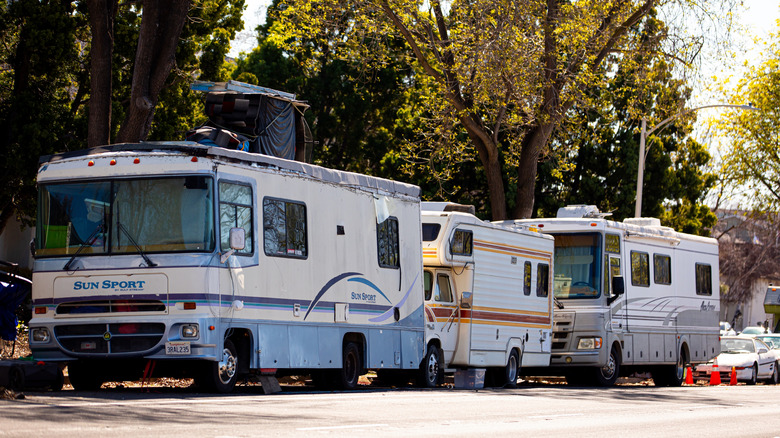California's New Law Could Cause A Major Shift In The RV Sales Industry As We Know It
According to a 2024 Journal of Consumer Affairs report, approximately 11.2 million households across the U.S. own a recreational vehicle, more commonly known as an RV. The report also noted that the RV industry was worth approximately $20 billion and expected to increase $9 billion by 2029. Interestingly, California was the top state for RV-related spending in 2019 at approximately $550 million, which is unsurprising, as California has some of the most scenic campsites. However, a state bill has caused some concern regarding the industry.
The bill in question is the Advanced Clean Trucks Act, which went into effect in 2025. It essentially mandates that all manufacturers of medium and heavy vehicles (Class 2B to Class 8) increase sales of their zero-emission vehicles (ZEV). The bill aims to have 55% to 75% of the state's RVs be zero-emission by 2035. California is not alone in its determination to have RV consumers shift towards more emissions-friendly vehicles — 10 other states, including Colorado, Maryland, New Jersey, and New York, have all enacted some version of similar regulations.
Before you brush up on your knowledge of the 3-3-3 rule for your next RV trip, you should know that news of the bill immediately created concern within the market. Many worried that it would negatively impact motorhomes that are still largely dependent on diesel fuel. Those against the bill argue that there is not yet readily available technology for production of these large zero-emission vehicles. As a result, the RV Industry Association quickly sought an exemption for motorhomes.
California is not banning RVs, but the industry is shifting
The popularity of RVs is unsurprising, as they are most commonly associated with camping and outdoor adventures. Many people would rather head out on a road trip than catch a flight, especially if they plan on embarking on America's best cross-country adventure, promising unmatched beauty. It is understandable that the potential threat of an RV ban would be concerning, but the California Air Resources Board (CARB), which is responsible for the bill, has clarified that its implementation will not directly result in a ban on all RVs. In fact, the bill was not intended for RVs. Instead, it was aimed at commercial freight vehicles. Unfortunately, many RV motorhomes use similar manufacturing parts as commercial freight vehicles.
So what RV vehicles are affected by the new regulations? As it currently stands, Class A and C motorhomes are impacted, as well as Class B camper vans that fall on the larger size. RVs not impacted by the regulations include detachable types, such as travel trailers and fifth wheels. Used RVs that have surpassed 7,500 miles are also exempt from the law. Supporters of the bill point to detachable RVs as an excellent alternative for outdoor enthusiasts, highlighting their flexibility. While California is certainly not banning RVs, the new bill and regulations that come with it could mean that the market may look very different in the coming years, especially since some manufacturers have already taken steps to remove their impacted models from California dealerships.

